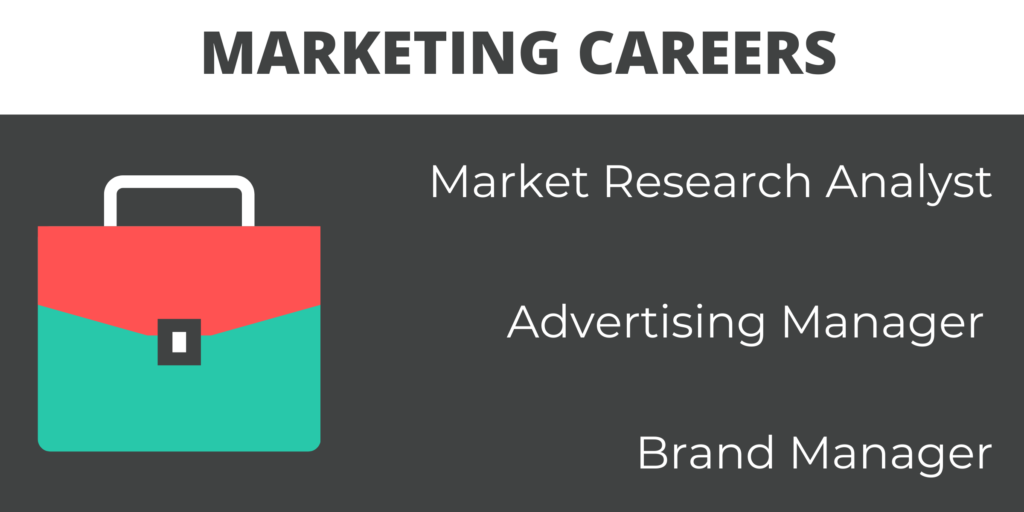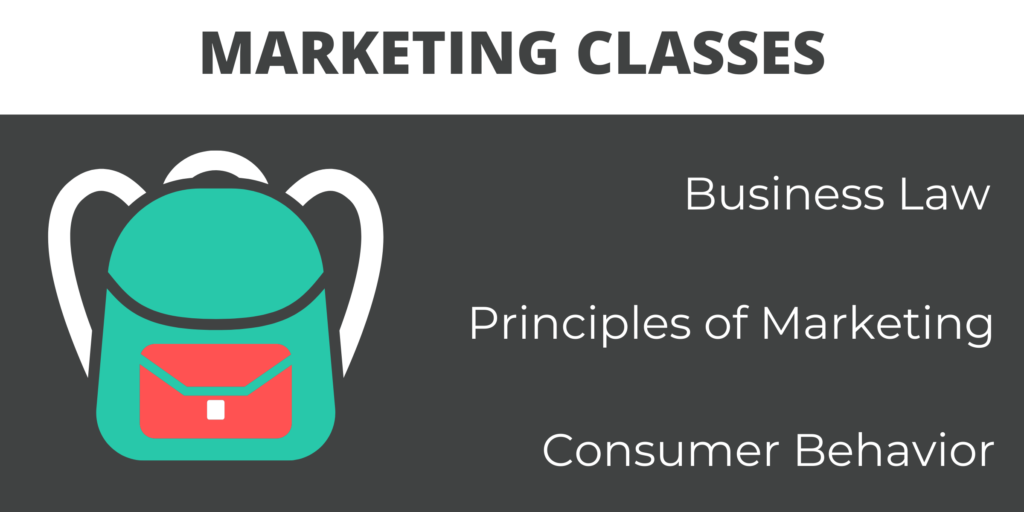What is a Career in Marketing?
What began as an art has become a ubiquitous surgical science of any business operation in 2020 and beyond. Any organization that wishes to build a brand, any business looking to sell a product–all use marketing in some form. Gone are the days of pre-internet admen who would create a marketing campaign from scratch and send it before the eyes of the world on billboards and subway posters.
These marketing approaches do still exist and are referred to as out-bound marketing, but by far the most dominating marketing approach is dubbed ‘in-bound’ marketing. This technique involves targeting value-propositions to bring a specific demographic customer to the brand. In-bound marketing is a relatively new phenomenon that only obtained viability with the advent of the internet and data science.
Now that companies can uncover vast amounts of data on who exactly their ideal customer is–marketing campaigns are designed almost entirely to target certain customers, at certain times, with precise language. This science–of building customer profiles, sighting-in online ads to target specific types of customers, and tailoring inbound marketing content to lure them in–is the primary concern of digital marketing professionals today.
Why Earn a Bachelor of Marketing?

Marketing is half-science and half-art, because the data science behind it is not yet so advanced that marketers can operate with infallibility or surgical accuracy. Marketing professionals spend much of their time testing the validity of various components of a marketing campaign. Repeating these tests over time contributes to a ‘feel’ for it–and being able to successfully demonstrate this ‘feel’ is what most in the industry would call skill.
Marketing professionals can cultivate this skill through time and practice in the workforce, through time and practice in a degree program, or through a combination of both–which might be the most well-rounded approach. Undoubtedly though, a Bachelor’s of Marketing is the most common in-road into the industry.
A Bachelor’s of Marketing program that is well-navigated and truly taken advantage of can certainly position students to take on mid-level positions of employment after graduation. The popularity of marketing careers means that the best positions are highly competitive and will require numerous distinctions–of which a strong Bachelor’s of Marketing is an excellent start.
Educational Paths & Career Outcomes

In answering the question, ‘What Can I Do with a Marketing Degree?’ it is important to first establish what area of marketing one wishes to specialize in. One of the primary choices is between that of marketing strategy and marketing research. Marking strategists are specialists who employ various promotion strategies, customer on-boarding, and lead generation techniques. Marketing researchers on the other hand focus primarily on data science, and the collecting of information which will better inform marketing strategy. Marketing professionals generally engage in both of these techniques, but many mid to high level jobs will require specializing in one approach.
While the BLS reports that market researchers earn about 10% less than their marketing strategist counterparts, there is also less schooling and experience required to become a marketing researcher. Most Bachelor’s of Marketing programs will offer sufficient coursework in both of these areas, but also offer degree specializations for students interested in specializing in Marketing Strategy or Marketing Research. If you would like to learn more about the difference between these two areas of marketing see our piece that covers it in more detail (What is the Difference between a Degree in Marketing and a Degree in Marketing Research?).
Additional Resources to Consider:
- How to Learn Marketing
- Do Associate Degree Programs in Marketing Have Time to Specialize in Certain Areas or Are They Focused on Overall Information?
- Do Most Companies Look at Someone with an Associate’s Degree of Marketing as Being Ready for Full-Time Employment in the Field?
- How Much Statistics Knowledge Should I Obtain to be More Successful in Sales and Marketing?
- When is the Best Time for Bachelor’s of Marketing Students to Begin Looking for Summer Internships?
- Will I Learn about Marketing in General in a Bachelor’s Degree Program or Can I Focus on Particular Areas within My Degree?
- What Websites Should I know how to Use when Starting a Marketing Program?
Catalogue of Marketing Degree Options

What one can do with a Bachelor’s of Marketing will depend mostly on the exact marketing degree one has earned. Beyond the basic distinction between marketing research and marketing strategy there are many other niche areas of the marketing profession that undergraduate degree programs offer specializations in.
While not totally exhaustive, here’s a breakdown of the most common undergraduate marketing majors, concentrations, and specializations options available on the higher ed market:
- Bachelor of Arts
A Bachelor of Arts will be more commonly offered at a liberal arts university where curriculum focuses on the theoretical and conceptual foundations of the profession. Critical thinking, analysis, and logic-based argument are major areas of focus in Bachelor of Arts in Marketing programs.
- Bachelor of Science
A Bachelor of Science will be the most common format of delivery for an undergraduate marketing degree. A Bachelor of Science program will focus more on a data-driven conception of the industry. These programs often construct curriculums which are heavily based in industry research and the scientific method.
- Bachelor of Business Administration – Marketing
- Bachelor of Business – Digital Marketing
- Bachelor of Business – Market Research
- Bachelor of Business – Market Strategy
- Bachelor of Marketing – General Studies
- Bachelor of Marketing – Social Media
- Bachelor of Marketing – Digital Marketing
- Bachelor of Marketing – Brand Development
- Bachelor of Marketing – Business Administration
- Bachelor of Marketing – Entrepreneurism
- Bachelor of Marketing – Content Marketing
- Bachelor of Marketing – Data Science
- Bachelor of Marketing – Business Development
- Bachelor of Marketing – Fundraising & Non-Profits
- Bachelor of Marketing – Management
- Bachelor of Marketing – Digital Marketing Management
- Bachelor of Marketing – Information Technology (IT)
Some major takeaways here are that students have some major initial decisions to make before enrolling in a Bachelor of Marketing program–the choice between a Bachelor of Science or a Bachelor of Arts, the choice between a business degree with a specialization in marketing or a traditional marketing degree, and the choice of a general marketing degree or a specialized one.
To decide which path if right for you, consider the following additional resources:
- What is the Job Market for Graduates with a Degree in Digital Marketing?
- What Kind of Jobs is there for a Degree in Digital Marketing?
- What is the Difference between a Degree in Marketing and a Degree in Marketing Research?
- What Degree Do Marketing Managers Have?
- What Degree Do I Need to Become a Digital Marketing Manager?
- How Much Statistics Knowledge Should I Obtain to be More Successful in Sales and Marketing?
- 20 Best Online Bachelor’s Degrees in Marketing
Self-Employed: Content Marketing, Digital Marketing, and Data Science

Earning a marketing degree in Content Marketing, Digital Marketing, or Data Science will position students to enter some of the most promising areas of the marketing industry. Content marketing refers to the marketing profession that is concerned primarily with developing marketing content–taking the form of various types of media such as written articles or graphical advertisements, promotional blurbs, or brand taglines.
Digital marketers are tasked with the elements of the marketing process that occur online and in digital format. Data science marketers employ various IT tools to convert raw data into actionable marketing information, such as crawling websites to generate leads or scraping competitor’s web data to analyze market share and opportunity.
But perhaps the most promising aspect of these areas of the marketing profession is that Content Marketers, Digital Marketers, and Data Science Marketers are able to earn top-end salaries of around $120,000 or more while maintaining self-employment. This sort of opportunity for self-employment is all the more valuable in current times of economic toil. As more professionals seek the safety of remote self-employment, these areas of the marketing profession become more competitive–so consider establishing a professional specialization in one of these three areas while the opportunities are still abundant.
Major Considerations in Entering the Marketing Job Market
With a Bachelor’s of Marketing there are some major questions that you need to answer in order to make the most of your time after graduation:
- Do you plan on seeking self-employment? Or do you plan on seeking employment with a marketing agency of clout?
- If you are wishing to begin a career of self-employment as a marketer, your success will depend on having the necessary skills. Whereas success in seeking employment with a high-end marketing agency will depend on having the right degree and the right background. The flexibility of self-employment as a marketer is the reason so many marketing professionals are choosing this option.
- Do you want to work on the specialist-end of marketing or as a manager?
- To become a marketing manager will require years of preparation and success in the job market. With this in mind, prospective marketing managers will need to establish their intent early. Many undergraduate marketing programs allow students to specialize in marketing management. Otherwise, students can start building specialized skills in a specific marketing practice.
- Do you want to eventually start your own agency–working as a self-employed marketing manager who employs several specialists?
- Many marketing agencies start with just a few marketing professionals who work together on contracts offered by small local business or regional organizations. These smaller agencies are able to offer much more affordable rates than high-end marketing agencies, and thus have a secure hold on their area of the market. Professionals interested in this route should build specialization in marketing management as well as specific skills needed in running a small business.
- Do you have entrepreneurial goals?
- Many marketing professionals enter into education in order to contribute to an existing family business, or to manage the marketing operations of a future small business endeavor. If this is the case, make sure that you examine your choices carefully to ensure you are building marketing speciality in the area of most value to your chosen endeavor.
- Do you plan on enrolling in a graduate or postgraduate marketing program?
- Many Bachelor of Marketing degree programs perfectly position students to pursue enrollment in top-end graduate marketing programs. Postgraduate education marketing programs are some of the most competitive programs in existence outside of medical school. If you wish to take the route of advanced education in marketing, be sure you are earning quality prerequisites in reputable undergraduate programs, internships, and employment.
- Does your current education level and professional resume reflect sufficient preparation for your goals?
- Let’s be honest. It is easy to set goals and difficult to achieve them. Many of the areas of highest reward and achievement in the marketing industry require years and years of preparation and execution. Particularly in areas of fierce competition, it might take a decade of continuous effort in order to actualize some of your career goals. So with this in mind, be sure that you are constantly maintaining an awareness of what is realistic at your current experience level–and if you need more experience, go out and get it.
- Many marketing degree programs can be completed entirely online and amidst even the busiest of work schedules. There has never been a better time to seek professional advancement as a marketer. Beyond degree programs there are a number of free opportunities such as online guides, blogs, and Massively Open Online Courses (MOOCS).
Additional Resources to Consider:
- When is the Best Time for Bachelor’s of Marketing Students to Begin Looking for Summer Internships?
- Do Most Companies Look at Someone with an Associate’s Degree of Marketing as Being Ready for Full-Time Employment in the Field?
- What is a Master’s in Digital Marketing?
- What Degree Do Marketing Managers Have?
- What Degree Do I Need to Become a Digital Marketing Manager?
- What Kind of Jobs is there for a Degree in Digital Marketing?
- What is the Job Market for Graduates with a Degree in Digital Marketing?
Most Wealthy and Prestigious Marketing Agencies in the World

A career in marketing–much like the practice of marketing–largely comes down to reputation and network. The most lucrative and prestigious employment opportunities are with prestigious marketing agencies with unblemished records of excellence. Earning employment at one of these agencies will be a career-defining event–that will simultaneously open doors to many future opportunities as well.
With this in mind, it is no surprise that landing employment at the most prestigious marketing agencies is no easy task. Many of these positions will turn down hundreds, if not thousands, of applications before finding the most qualified candidate. We point this out not to discourage you, but to illuminate the fact that taking this road will require tremendous dedication and preparation.
With that said if you are at the top of your game and want to work with the best of the best, then consider applying to one of these top-end marketing agencies:
- Accenture Interactive
Location: New York City, New York
Revenue: Estimated $4.5 billion
With 40 offices located around the world housing over 18,000 employees, Accenture Interactive is the largest marketing company by revenue alone. Accenture found its way to international headlines recently as it landed the contract for Maserati–a notoriously high-end automobile brand.
Working with Accenture Interactive is an excellent way to build experience around the industry’s best and most talented. Also, the sheer size of the company ensures that there are a number of opportunities at all levels of expertise–meaning students should definitely consider pursuing an internship at Accenture during or after their Bachelor’s program.
- IBM iX
Location: Armonk, New York
Revenue: Estimated $3 billion
IBM iX is the design & marketing arm of parent company, IBM. With more than 15,000 employees stationed in around 40 offices around the world, IBM iX is one of the largest and most reputable marketing entities in existence. Because IBM iX confers the reputation of its parent company, it maintains one of the most extensive networks of international corporate business. IBM iX is most known for its clients–the Atlanta Falcons and Purina.
If you are able to find employment with IBM iX you will find yourself plugged into the marketing industry at a tremendous scale. Employment opportunities run the gambit of traditional roles to the bleeding-edge, and can lead to employment in metropolises around the world.
- Dentsu
Location: Tokyo, Japan
Revenue: Estimated $2.4 billion
Dentsu is the largest marketing company in Japan and is a name of tremendous prestige and respect due to its nearing 120 year old tradition of international success. Despite its positioning overseas, Dentsu remains firmly positioned as a primary force in the marketing industry and works closely with global clients such as Facebook.
For students who wish to build a marketing career within a different organizational structure (known as Z-structure in organizational psychology), Denstu might be the ideal opportunity for marketing professionals. Dentsu conducts business across eight primary sectors which cover pretty much every conceivable angle to marketing endeavors, and thus is a viable endpoint for any marketing specialist.
- Epsilon
Location: Irving, Texas
Revenue: Estimated $2.4 billion
By spreading out 8,000 industry-leading marketing specialists around the world in more than 70 offices, Epsilon has positioned itself as a major global player in marketing. Epsilon is a name most closely associated with bleeding-edge marketing technology. Most recently, MediaPost named Epsilon #1 for ‘Best use of Artificial Intelligence, machine learning, and data-driven marketing’ and also ranked #1 in the industry for its transactional and behavioral data.
Marketing professionals who specialize data science or other IT specialties will probably see Epsilon as the holy grail of employment opportunities. There are simply few places to work that will provide such opportunity to work on the front-lines of marketing research and development.
- Publicis Worldwide
Location: Paris, France
Revenue: Estimated $1.40 billion
With more than 330 offices located in over 110 countries, Publicis Worldwide is one of the largest marketing companies in the world. With several offices around the United States, American marketing professionals can seek employment either at-home or abroad. Publicis is most well-known for its contracts with CitiBank, Heineken, L’Oreal, and Nestle.
Publicis also is spearheading the charge into more conservative energy management. For marketing professionals interested in working on the frontlines of the marketing industry who want to fight for the conservation of our environment, there are likely few better than Publicis.
6 Lucrative Marketing Jobs
Given the investment of time and money involved in earning a Bachelor of Marketing degree, it is no surprise that students desire some peace of mind–that upon graduation they will be able to find gainful employment. Moreover, professionals need incentives to continuously dedicate time and effort to their careers. So below we have compiled some of the most promising marketing jobs that demonstrate strong metrics of earning potential and job growth (note: salaries are estimates based on ranges of aggregate data).
- Corporate Communications Director
Average salary: $125,000
Salary range: $75,000 – $175,000
A corporate communications director is tasked with both the marketing and PR responsibilities of managing a large corporation’s brand and company image. These professionals are business-specialists and masters of marketing and promotion, often overseeing multiple marketing and business departments. This position is the ultimate achievement for the majority of marketing professionals.
- Marketing Research Director
Average salary: $110,000
Salary range: $75,000 – $155,000
This position is reserved for marketing research professionals with years of professional success and the necessary education. This position typically represents a promotion from an upper-end marketing research management position, and scales up both responsibilities and the number of marketing researchers under their direction.
- Director of Email Leads/Marketing
Average salary: $100,000
Salary range: $60,000 – $160,000
A Director of Email Leads and Marketing will oversee a company’s marketing efforts related to email outreach, customer retention, and customer on-boarding. These directors often employ a command of data science and industry-software to automate large portions of this process, and will also oversee teams of supporting email marketers.
- Director of Digital Marketing
Average salary: $100,000
Salary range: $60,000 – $150,000
A director of digital marketing is responsible for the various tasks associated with executing marketing strategy online. These directors oversee social media marketing campaigns, lead generation efforts, as well as digital content marketing and strategizing. As such these directors are essentially the swiss-army knifes of marketing agencies and should have backgrounds that demonstrate their adaptability.
- Product Marketing Manager
Average salary: $90,000
Salary range: $60,000 – $130,000
Product marketing managers are tasked with overseeing the promotion of a particular product from the time of its inception to the time it goes to market and beyond. These marketing professionals develop highly targeted marketing campaigns both through in-bound and out-bound approaches. While these managers might not have the skillset to accomplish all of these tasks, they will certainly be tasked with hiring specialists who do.
- Brand Marketing Manager
Average salary: $75,000
Salary range: $50,000 – $110,000
A brand marketing manager is responsible for overseeing the design, execution, and promotion of a company’s brand. Like a product manager is solely responsible for the promotional success of a product, a brand manager is solely responsible for the functionality and promotionality of a brand. This position is typically reserved for marketing professionals who have previously demonstrated success in developing and promoting brands or products.
Carrie Morris
Author
Warren Dahl
Editor-in-Chief

